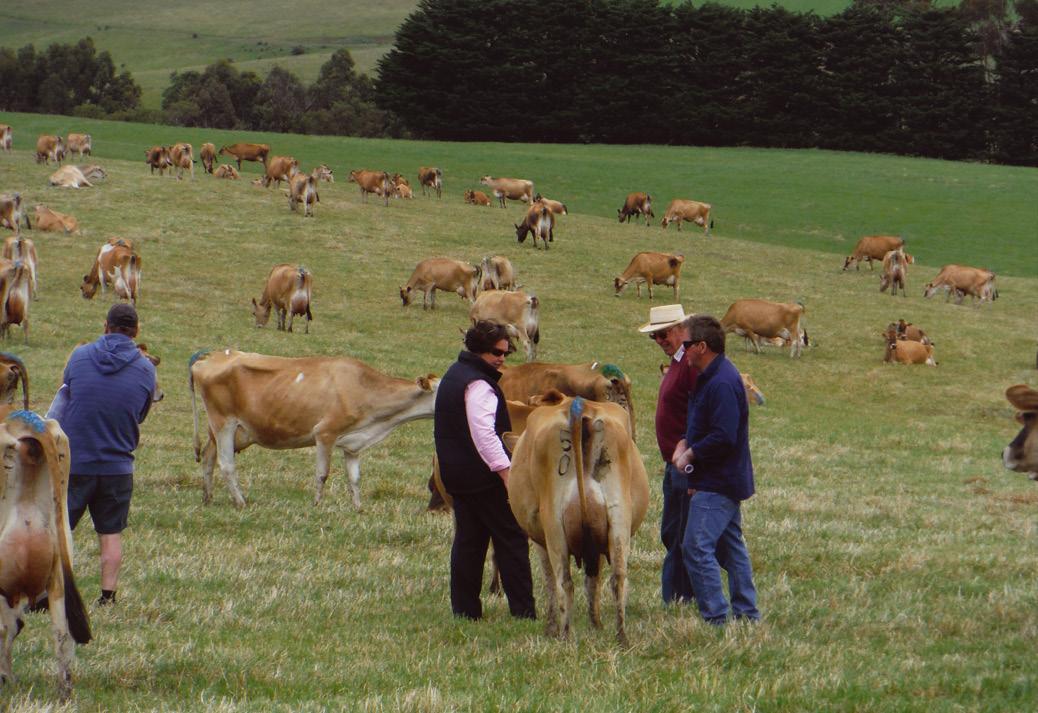
4 minute read
Genomics Uncovers Surprises In The Bull Pen
WORDS // DATAGENE
Lyn Parish selects natural sires based on the genomic information for the traits wants to improve in the herd, instead of selecting a natural bull because he was ‘out of a good cow’.
Advertisement
WHEN Lyn and David Parish (Dornoch Jerseys) decided to have their natural service bulls genomically tested, they never imagined unlocking an opportunity for their genetics to be marketed to a worldwide audience.
Their main motivation was to use genomic ABVs of their natural sires to inform their breeding program.
“By genomically testing our natural service bulls, we can treat them with the same scrutiny as when selecting our AI team,” Lyn said. “Genomic testing has helped us identify which bulls to keep, which bulls we may have overlooked, as well as those that don’t meet our breeding requirements.”
When Lyn received the genomic results of their 2019-born bulls, she was surprised that one returned a BPI more than 40 points above his parent average ABV.
In the April 2021 ABV release, that bull – Dornoch Jetfight Pilot made it into the Jersey Good Bulls Guide as STGPilot with a BPI+266.
He has been purchased by ST Genetics, standing at the Total Livestock Genetics centre in Camperdown, with both sexed and conventional semen to be distributed throughout Australia and abroad.
The Parishes milk about 600 registered Jerseys at Winchelsea, 40 km south-west of Geelong in Western Victoria.
From July 2021, a neighbouring property will be taken on by Lyn and David’s daughters Jodie and Wendy, Jodie’s partner Will and Wendy’s husband Matt.
The two businesses will share some equipment and resources, with Lyn and David sending a large group of cows to the new farm to get things started.
Lyn and David have been part of the Ginfo project for the past five years and were one of the early Australian Jersey herds to be genomically tested.
Over the years the Parishes have seen a dramatic rise in the overall genetic merit of their herd, from a herd average BPI -39 in 2015, BPI +105 in 2021.
The herd currently ranks 53 in 294 milk recording Jersey herds for BPI in Australia.
“The continued genetic improvement of our herd is very important to us,” Lyn said.
“Since we began genotyping our cows and supplying data to the Ginfo program, it has given us something to reach for – to get among the top BPI herds with good productive cows that are structurally sound with great longevity.”
The Parishes use a corrective mating strategy. For the first round of AI, sexed Jersey semen is used over the maiden heifers and high genetic merit cows.
The remaining cows are bred to conventional AI while homebred natural bulls are used to mop-up the heifers at the completion of the AI service.
Lyn selects natural sires based on the genomic information for the traits she requires, instead of selecting a natural bull because he was ‘out of a good cow’. Daughter fertility is becoming increasingly important. “We also emphasise overall type and udders as well as fat and protein. Components are really important.”
Since introducing sexed semen in 2017, the Parishes have had a 60% increase in heifer replacements, allowing for greater selection pressure on animals coming into the herd.
With surplus replacements, Lyn is now using genomics to identify the lower genetic merit cows to then cross to dairy beef.
Lyn genotypes all heifer calves at birth, using the early data to make decisions on which heifers to keep and which to sell.
With the ABVs of genotyped natural sires comparable to those of an AI sire, Lyn no longer gives the AI heifers preferential selection when making her culling decisions.
“The results have shown that some of our natural bred heifers are right up there with the AI heifers. Of our heifers due to enter the herd this year, the number 3 on the BPI list is the daughter of a homebred bull.”
Sired by the son of the Parishes number one BPI cow, Dornoch 4656 EX93, cow 5644 has returned a BPI(g) +285 with +109 Overall Mammary and +108 Survival.
“Her sire (Dornoch Oliver 2044) was only used for a short period. He was sold before we started testing our bulls,”
Lyn said. “If we had tested him, maybe we would have known how good he was and kept him a little longer.”
Rearing 15-20 bull calves each year, the Parishes retain three young bulls for their own use. The remaining bulls are sold at 18-20 months of age to local farms as natural service sires. When selecting her team of natural bulls, Lyn looks for the top rated BPI bulls, while examining the genetic merit of the dam, the dam’s Production Index (PI) and conformation, and the sire of the calf – prioritising alternative bloodlines.
Apart from breeding and culling decisions, Lyn includes parentage identification as an important benefit of genomic testing natural bulls.
“We run a natural bull with the heifers after we finish AI, and there are times we need to rest and rotate the bulls,” Lyn said. “There have been times when a calf is born during the cross-over period where the sire can be hard to determine. Now that our natural bulls have been genomically tested, we can easily identify the sires of the calves born.”
COLAC JERSEY BREEDERS CLUB
President: Des Parker – Secretary: Morgan Nelson
Life members: Bob Mellross, Anne Mercer, Ted Codling, Jim Parker and Jim & Glenda Carson
It's Back To Business @ Colac Jersey Club!
That means Farmwalks, Heifer Tours, On Farm Challenges, Get Togethers and sharing ideas. See you there.
We would also like to welcome our new club secretary - Morgan Nelson









